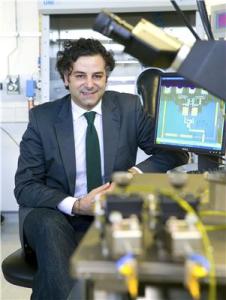A Tyndall National Institute research team in UCC, Cork, has created a non-contact microchip sensor that could be used to track the respiratory rate without having to touch the patient.
It enables continuous monitoring of babies in cots, healthcare patients and others afflicted with various other respiratory problems including sudden infant death syndrome (SIDS). It can also be used for early detection of sudden sleep periods of vehicle drivers caused by fatigue.
 Professor Domenico Zito, Tyndall National Institute, UCC
Professor Domenico Zito, Tyndall National Institute, UCC
The technology could also be applicable in monitoring patients at home, transferring data to the physician and paramedical personnel in hospitals. It monitors fitness and fatigue levels in people who are otherwise healthy. It could also be used in defense applications to track moving objects.
The device comprises an ultra-wide-band pulse radar to track minute movements. The radar emits nano-scale pulses in the direction of the chest, sensing the echo close to the skin. The signal is sensitive to the movement of the chest. The devices comply with stringent international norms stipulated for medical devices.
Tyndall and Lecturer in Microelectronic Engineering at University College Cork Dr Domenico Zito said his team worked with researchers in Bioengineering led by Professor Danilo De Rossi at the University of Pisa, Italy. The project paper was presented at the IEEE International Solid-State Circuits Conference 2011 held in San Francisco. The team says the device could impact respiratory disease management and reduce infant mortality caused by SIDS, or fatal accidents caused by driver fatigue. The device will also offer physicians an access to comprehensive data derived over long periods.
The research was funded by Science Foundation Ireland (SFI), the Irish Research Council for Science, Engineering and Technologies and the European Commission.